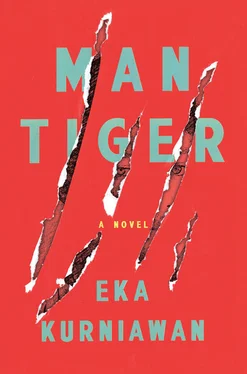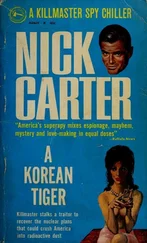After Komar stopped giving a damn, Nuraeni took more pride in the house, although Margio and Mameh soon realized she had an extremely weird idea of decor. One day she cut up some old calendars, and pinned pictures of the Taj Mahal and the actress Meriam Bellina to the wall above the wooden chairs in the living room where they received guests. She also cut up Margio’s old drawing book, where she found Margio’s inept drawings of mountain scenery along with some calligraphy, and put these up next to the door. No one commented, neither Margio nor Mameh. They worried that would only make her sadder, though it was plain that what she was doing didn’t make her happy either.
Then one day she received an allamanda seedling from an old neighbor. The yard had always been totally bare, a place for children to play marbles, but now she planted the seedling there. Margio was glad she had something to keep her occupied, no matter how trivial, though he had lost his spot to play marbles. Every morning Nuraeni watered her plant, and by the time it started to look firm and the leaves were no longer drooping, she got a bundle of golden dewdrop seedlings. She turned them into a living fence around the front yard, leaving a narrow space through which people could walk into the house. She watered the golden dewdrops, and Mameh sometimes thought she seemed more interested in the care of her plants than in that of her children.
One by one other flowering plants arrived, while the allamanda and the golden dewdrops grew sturdier and greener. She planted jasmine by the kitchen wall, roses in four groups near the golden dewdrops, and then came the mussaenda. Globe amaranths thrived alongside the ditch flanking one side of the house. Lantana shrubs grew next to the terrace’s disintegrating wall. Wild lilies bloomed near the garbage hole, and from the tall old allamanda she took seeds and planted them in the eastern corner of the yard. They had most extensive flower garden in the entire town, putting any flowershop to shame, because Nuraeni grew even the achiote, together with the saka siri, both of which required a great deal of moisture in the soil. The coastal morning glory was left to creep up a bamboo pole that leaned against the kapok tree.
Further plantings came in the form of hibiscus and jungle flame, which seemed to bring density to the limited space of the yard, together with the bougainvillea whose seeds Margio brought home from school. Last were several orchids planted in coconut shells and hung from the house’s rafters. Komar watched the spread of flowers with awe, thinking his wife was beautifying their house, and hoping it would improve her attitude. The plants became lush with the arrival of the monsoon season, and some began to bud. Colors appeared amid the jungle of green, and like his father, Margio spied on Nuraeni, hoping to see her cheerful at the luxuriant growth in her garden.
It turned out the plants were too healthy. The yard, which they had imagined a beautiful garden adorning their little house, was now a jungle, with blooms popping up every which way. Months passed and the allamanda began to soar, its highest tips slithering over the roof, its bright yellow flowers contrasting sharply with the blue sky, enchanting butterflies. The jasmine by the kitchen wall was a glimmer of white against a dark-green background, like stars in a night sky. Everything spread rapidly, like the dense golden dew-drops that had grown into a solid fence.
The garden became indistinguishable from dense undergrowth, and Margio started to call it a wilderness. The leaves either withered or jostled each other for light. Komar realized his assumptions about what Nuraeni was doing were quite wrong, and he treated the plants with his old disgust. Returning from the barbershop, he’d let the wheels of his bicycle squash some golden dewdrops, or hurl the bike onto a rose bush. The mistreatment killed some of the plants, and others withered, adding to the chaos. Within two years, no one could see the façade of the house; it was covered entirely by shimmering green leaves. When guests came, they had to ask where the front door was. Dead plants fertilized the soil, and the remainder thrived.
One day Mameh saw a snake slithering over the terrace and screamed until Margio caught it. It was a small, common tree snake, a venomless and quite harmless kind. Kids would play with them, letting them glide in and out of their fingers, and magicians managed to slide them into one nostril and out the other. But it made Mameh think about chopping down Nuraeni’s flowers, or at least returning the yard to the beautiful garden it once was, with slender, well-trimmed trees. She was all set with a machete and a stick, but Nuraeni caught her, and said to her firmly, “No!” Mameh didn’t dare argue, for the expression on her mother’s face said she wouldn’t tolerate anyone touching her wilderness. Mameh gave up and put the machete and stick back in the kitchen.
Only later did Mameh understand what her mother was up to. Nuraeni hoped to make the house as ugly as possible, as much a ruin as she had said it would be on the first day they arrived. Such a depth of bitterness expressed in this ironic manner, as she spoiled the house with flowers, scared Mameh.
She never tried to touch the plants again. No matter how much she wanted to pick the brilliant jasmines or the blood-red roses, she always held back for fear of her mother. Mameh had never seen Nuraeni furious before, anger being Komar’s privilege — not until she tried to touch the flowers. It frightened her. She thought that if Nuraeni really lost her temper, the results would be far worse than her husband’s everyday brutality.
The flower jungle became more than a nest for snakes and caterpillars; it was a hideout for foxes and thieves. The neighbors did laugh about it now, and Komar continued to crush the flowers. If someone asked what the flowers were for, Nuraeni was quick to reply: “For my funeral.”
Only once did Mameh see Nuraeni plucking flowers, not long after Marian died. She was singing strange ballads, which Mameh didn’t recognize. Perhaps they dated back to the time when her mother was still a girl. These melancholy songs flowed, while her fingers tweaked each flower carefully and placed it in her basket. It was as if plucking the flowers were the same as killing them, and her sorrow for them as great as the void left by the baby.
When Komar bin Syueb died, Mameh followed her mother’s example by picking flowers for the burial. At first she thought her mother would let her do it, because so little had been given to the dead man, but the look on her face made it clear that Nuraeni disapproved. She had given too much to that bastard already. But Mameh was now a young woman, and didn’t always obey her mother’s wishes. She kept picking flowers, regardless of her mother’s pain.
By this time Margio had concluded that nothing would ever make Nuraeni happy. Certainly not the flowers. As long as they reigned over the yard, turning it into a crazy jungle, Nuraeni’s nonsense chats with the stove and pan were unstoppable, a symptom of a grief that never left her. But even if the flower jungle didn’t make her happy, it gave her some kind of solace, and for that small blessing, the normally careless Margio was always extra careful around the plants. Nothing else came close to lifting his mother’s mood.
Until one day after he had stayed up really late watching a wayang performance about the death of Semar, the mysterious and powerful pariah god. He had come home to get something to eat that morning, after briefly sleeping at the nightwatch hut, and he found his mother beaming. He had never seen her like this. There was color in her cheeks. Her round eyes were brighter and, look, she had lipstick on, and face powder, and looked washed and fresh, too.
Читать дальше












